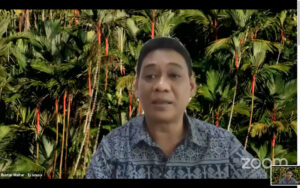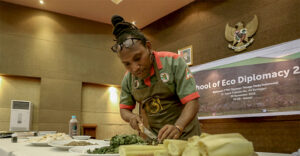West Papua Province has developed Regional Low Carbon Development Plan (RLCDP) document. The document was handed over to the Environment Directorate of the National Development Planning Agency (Bappenas) on Tuesday, 20 September 2022. The RLCDP document will serve as the guideline for policy makers and development actor in West Papua Province related to climate change issue. RLCDP has emission projection and strategy of emission reduction up to 2060.
“We hope that various policies on sustainable development in the RLCDP could support the West Papua provincial government effort to boost economic growth, social life, and at the same time maintaining carrying capacity and environmental capacity,” said Medrilzam, the Environment Director of Bappenas.
The RLCDP document aims to strengthen an integration across sector in decision making for green investment, climate smart agriculture, climate resilience, and makes West Papua as the destination of sustainable development province. The document is arranged by the government of West Papua with the supports from Bappenas and development partners.
Read also: Indonesia-Norway New Deal Can Boost FOLU Net Sink Target Achievement
In the document, the government of West Papua is expected to apply the downstream of non-timber forest product (NTFP) and green energy such as biomass, pellet, and bioenergy. Some other NTFP products are like masohi oil, nutmeg oil, nutmeg balsam, clove oil, agarwood oil, red fruit oil, virgin coconut oil, ant nest, tapioca powder, purple sweet potato powder, and honey. This is done as efficient utilization of natural resources to bolster economic growth while improving environmental quality.
Bappenas and West Papua government expected that the RLCDP could help reduce greenhouse gas emission. “The regional government gives positive welcome and enthusiasm to the RLCDP document. The document could serve as the guidelines for long term development in West Papua in terms of potential projection and action to develop and maintain to meet the Low Carbon Development goal up to 2060,” said Dance Sangkeh, West Papua Province’s Head of Regional Development Planning Agency.
Low Carbon Development is a development intended to sustain social and economic growth through emission low development and minimum exploitation of natural resources. The government is committed to reduce emission by 29 percent up to 2030 as agreed by the Paris Agreement. The development program here is included in the 2020-2024 National Medium Term Development Plan.
Read also: Blue Economy Financing, An Inevitability
The report on Indonesia Low Carbon Development Initiative shows that low carbon development could boost the Gross Domestic Product (GDP) by 6 percent in 2045 which is higher than the current growth of around 5 percent. Unlike the current development paradigm that produces a lot of greenhouse gas emission, the low carbon development can reduce greenhouse gas emission nearly by 43 percent in 2030 which exceeds the target of Indonesia’s Nationally Determined Contribution (NDC).
West Papua is one of the provinces signing the Memorandum of Understanding (MoU) with the Bappenas on Low Carbon Development as a sustainable development commitment. Other provinces that also agree with Bappenas are South Sulawesi, Central Java, West Java, Papua, Bali, and Riau. Together with Papua Province, West Papua Provincial government also agreed with the Declaration of Manokwari covering some crucial points for sustainable development which is based on customary areas in Tanah Papua.
EcoNusa’s Policy and Advocacy Manager, Cindy Simangunsong, appreciated the launching of West Papua Province’s RLCDP document. As to her, the document is proven serious commitment of West Papua government for sustainable development and defending the Papuan forest as mandated by the Declaration of Manokwari.
Read also: Sustainable Development in Tanah Papua: Development Partners Joint Commitment
“The RLCDP document shows a very good collaboration among the provincial government and other stakeholders, including academician and CSOs. The LCDP here is expected to provide space to the indigenous community in sustainable and local wisdom-based natural resources management,” she said.
Editor: Leo Wahyudi







